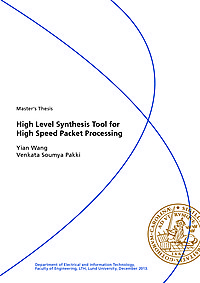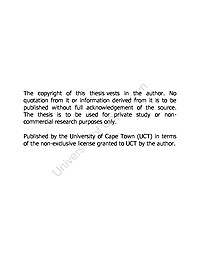
High Level Synthesis Tool for High Speed Packet Processing
The main objective of this Master Thesis is to design and implement a high level synthesis tool for high speed packet processing. For a given network packet, determining the destination and performing the required alterations to the packet are the key parts of Packet Processing. The idea is to provide customers a customized Ethernet switch which is reliable and flexible. As a requirement for this, a high level packet processing language (PPL) is designed instead of any hardware descriptive language because of the regularity of packet processing. The packet processing is described in a powerful way based on the PPL. In this thesis, a design of Ethernet switch based on the PPL is proposed. Hardware implementation is done for the design and MyHDL is used as the hardware description language. Using Python, the compiled PPL program is translated into an hardware model. A tool has been developed which consists of a hardware generator and certain hardware infrastructures. Another part in the thesis is optimization of the initial design. For instance, optimization is done to run as much code as possible in parallel or for removal of unused hardware in the generated switch. Verification is done and synthesis results have been listed comparing the two designs. Hence, we conclude that the initial design is more flexible and has more redundancy while the optimized design is more friendly to hardware cost and power consumption.

Accelerating Gauss-Newton Filters on FPGAs
Radar tracking filters are generally computationally expensive, involving the manipulation of large matrices and deeply nested loops. In addition, they must generally work in real-time to be of any use. The now-common Kalman Filter was developed in the 1960's specifically for the purposes of lowering its computational burden, so that it could be implemented using the limited computational resources of the time. However, with the exponential increases in computing power since then, it is now possible to reconsider more heavy-weight, robust algorithms such as the original nonrecursive Gauss-Newton filter on which the Kalman filter is based[54]. This dissertation investigates the acceleration of such a filter using FPGA technology, making use of custom, reduced-precision number formats.

High Level Synthesis Tool for High Speed Packet Processing
The main objective of this Master Thesis is to design and implement a high level synthesis tool for high speed packet processing. For a given network packet, determining the destination and performing the required alterations to the packet are the key parts of Packet Processing. The idea is to provide customers a customized Ethernet switch which is reliable and flexible. As a requirement for this, a high level packet processing language (PPL) is designed instead of any hardware descriptive language because of the regularity of packet processing. The packet processing is described in a powerful way based on the PPL. In this thesis, a design of Ethernet switch based on the PPL is proposed. Hardware implementation is done for the design and MyHDL is used as the hardware description language. Using Python, the compiled PPL program is translated into an hardware model. A tool has been developed which consists of a hardware generator and certain hardware infrastructures. Another part in the thesis is optimization of the initial design. For instance, optimization is done to run as much code as possible in parallel or for removal of unused hardware in the generated switch. Verification is done and synthesis results have been listed comparing the two designs. Hence, we conclude that the initial design is more flexible and has more redundancy while the optimized design is more friendly to hardware cost and power consumption.

Accelerating Gauss-Newton Filters on FPGAs
Radar tracking filters are generally computationally expensive, involving the manipulation of large matrices and deeply nested loops. In addition, they must generally work in real-time to be of any use. The now-common Kalman Filter was developed in the 1960's specifically for the purposes of lowering its computational burden, so that it could be implemented using the limited computational resources of the time. However, with the exponential increases in computing power since then, it is now possible to reconsider more heavy-weight, robust algorithms such as the original nonrecursive Gauss-Newton filter on which the Kalman filter is based[54]. This dissertation investigates the acceleration of such a filter using FPGA technology, making use of custom, reduced-precision number formats.
















